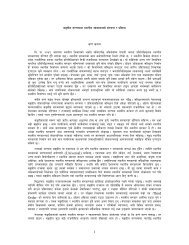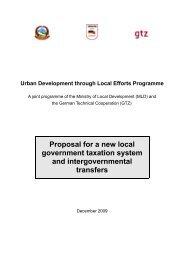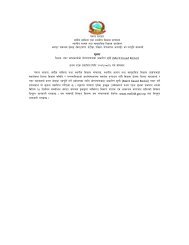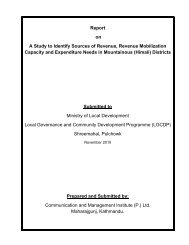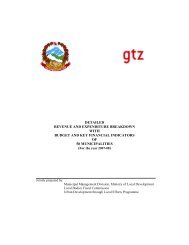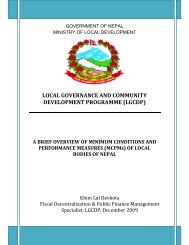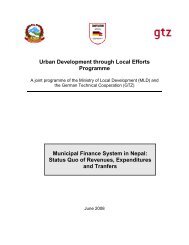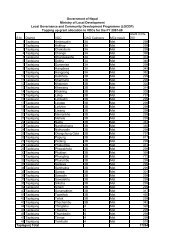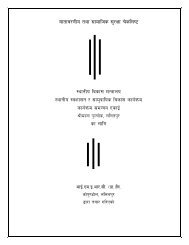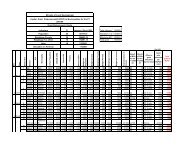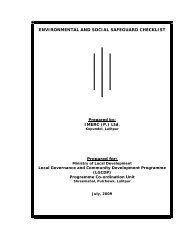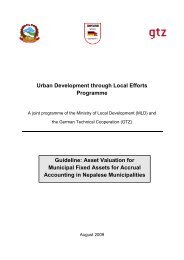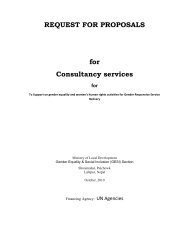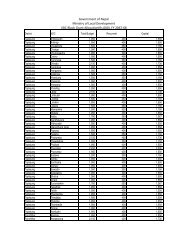GTZ Report on Accrual Accounting Status Quo - LGCDP
GTZ Report on Accrual Accounting Status Quo - LGCDP
GTZ Report on Accrual Accounting Status Quo - LGCDP
Create successful ePaper yourself
Turn your PDF publications into a flip-book with our unique Google optimized e-Paper software.
Cash <strong>Accounting</strong> vs. <strong>Accrual</strong> <strong>Accounting</strong> 8<br />
A Cash flow statement is essential because even a surplus in the balance statement is no guarantee that sufficient<br />
resources for operati<strong>on</strong>al activities are available. Cash flows are inflows and outflows of cash and cash equivalents.<br />
Receipts of cash (cash inflow) are booked according to the source of funds. Disbursements (cash outflow) are booked<br />
according to the applicati<strong>on</strong> of funds. On each side the values are separated according to operating, investing and<br />
financing activities. These informati<strong>on</strong> allow to ensure operating activities of a municipality and also allow to decide <strong>on</strong><br />
future investment activities and liquidity needs.<br />
Overview 2: The three most important dimensi<strong>on</strong>s of <strong>Accrual</strong> <strong>Accounting</strong> Financial Statements<br />
Cash Flow<br />
Statement<br />
Balance<br />
Statement<br />
Income<br />
Statement<br />
Cash Receipts<br />
Disbursements<br />
Debits<br />
Floating<br />
assets<br />
Credits<br />
Equity<br />
capital<br />
Revenues<br />
Expenses<br />
Liquidity<br />
capital<br />
assets<br />
Debits<br />
Reserves<br />
Liabilities<br />
Credits<br />
Fiscal Year<br />
Outcome<br />
2.4. In-Betweenism: Mixed Approaches of Cash and <strong>Accrual</strong> <strong>Accounting</strong><br />
When looking at accounting systems in the public sector usually mixed approaches rather than pure forms of cash<br />
based accounting or accrual based accounting are in place. These mixed forms of accounting systems are in practise<br />
at different government levels and countries.<br />
In both systems differences arise <strong>on</strong> the <strong>on</strong>e hand about the time of booking and <strong>on</strong> the other hand <strong>on</strong> the<br />
prec<strong>on</strong>diti<strong>on</strong>s for booking.<br />
The modified cash basis of accounting recognizes transacti<strong>on</strong>s and events which bel<strong>on</strong>g to the previous fiscal year<br />
and normally would be reflected in a cash inflow or outflow within the current fiscal year (Schiavo-Campo & Tommasi,<br />
1999, p.3). The difference compared to the pure cash accounting system lies in the fact of leaving “the books open” for<br />
cash transacti<strong>on</strong>s (mostly expenditures, sometimes also revenues) that are related to the previous fiscal year<br />
throughout a complementary period during the next fiscal year. Therefore it recognizes cash transacti<strong>on</strong>s that bel<strong>on</strong>g<br />
together and ensures a greater “c<strong>on</strong>formity” within <strong>on</strong>e fiscal year (Schiavo-Campo & Tommasi, 1999, p.3).



